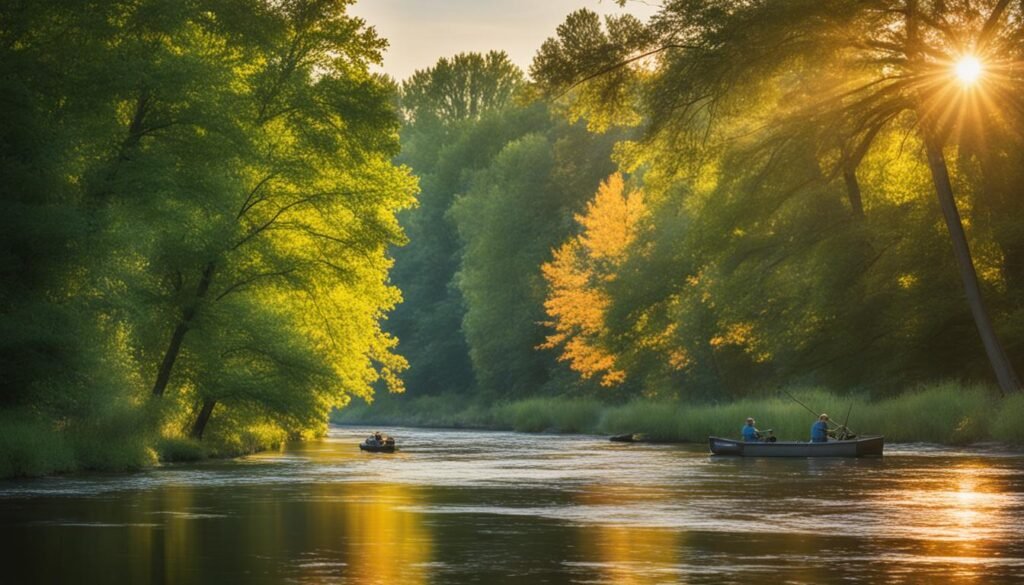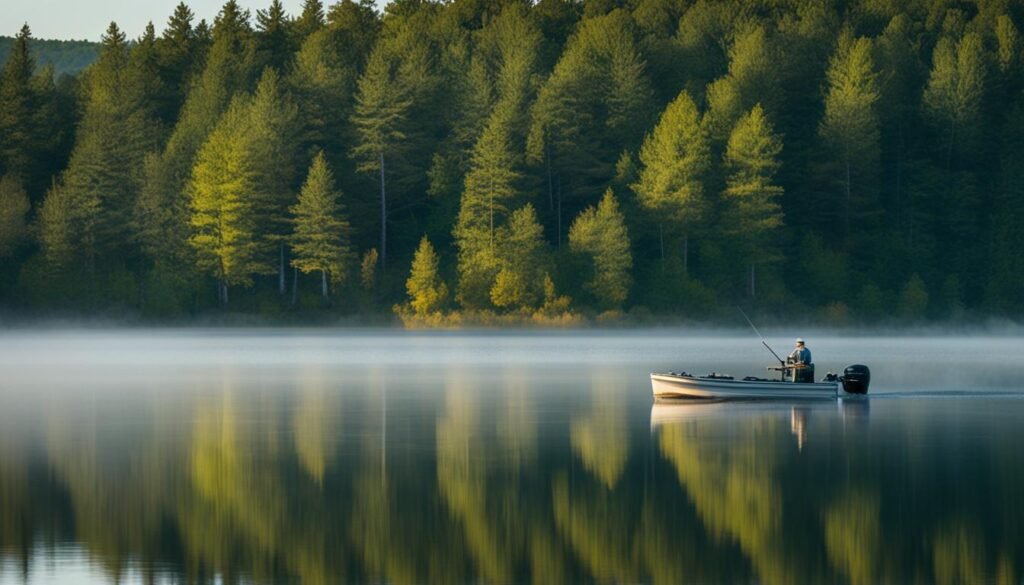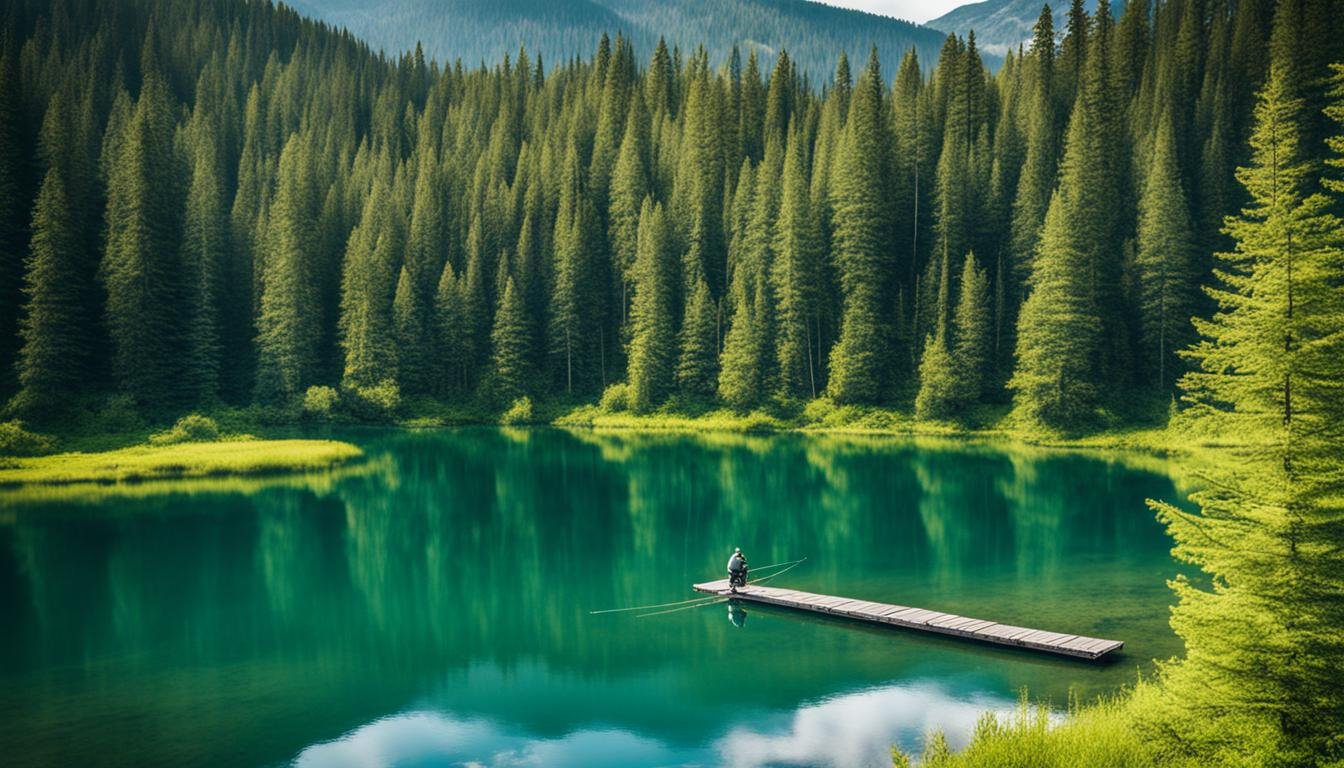Canada offers amazing fishing spots for new anglers. You’ll find perfect places to cast your line and catch your first fish. These spots cater to all skill levels and provide great freshwater fishing experiences.
From peaceful family-friendly lakes to exciting adventures, Canada has it all. You can immerse yourself in the country’s famous fishing landscape. Get ready to explore top fishing destinations across the nation.
Key Takeaways about Best Beginner Fishing Spots
- Discover the top beginner-friendly fishing destinations in Canada
- Explore a diverse array of fishing experiences, from serene wilderness to urban ponds
- Learn how to access these prime fishing spots and the species you can expect to catch
- Gain insights into the essential fishing gear and regulations to ensure a successful first outing
- Unlock expert tips to help new anglers maximize their chances of catching fish
Introduction to Fishing in Canada
Fishing is a beloved activity in Canada, deeply rooted in its natural heritage. The country’s vast waterways are home to diverse fish species. From quiet lakes to northern wilderness, fishing offers endless thrills for anglers.
It’s a key part of the Canadian outdoor experience. Fishing attracts enthusiasts from all over, seeking tranquility or adrenaline-fueled adventures.
Why Fishing is a Popular Pastime in Canada
Canada boasts a wide range of Fishing Destinations suitable for all skill levels. Urban ponds, stocked lakes, and wilderness retreats offer options for beginner fishers.
Freshwater Fishing is a favorite in Canada. Anglers can target various Freshwater Fish species like trout, bass, walleye, and pike.
Overview of the Best Beginner Fishing Spots
Let’s explore some of Canada’s Best Beginner Fishing Spots. We’ll highlight their unique features and opportunities for new anglers.
These prime Fishing Destinations for Beginners offer memorable experiences. They’re perfect for Family-Friendly Fishing or thrilling Outdoor Recreation adventures.
Best Beginner Fishing Spots
Algonquin Provincial Park and the Bay of Quinte are top fishing spots for new anglers in Canada. These areas offer unique and beginner-friendly fishing experiences. Each location has its own special appeal and challenges.
Algonquin Provincial Park: Beautiful Trout Fishing
Algonquin Provincial Park is a trout fishing paradise in Ontario. The park has many clean lakes and streams full of wild brook trout. These fish are eager to bite flies or lures.
The park is great for beginners because it’s not too crowded. You can fish in peace and enjoy nature. Spring and fall are the best times to catch trout here.
Algonquin is perfect for those new to wilderness fishing. It offers a true outdoor adventure for anglers of all levels.
Bay of Quinte: World-Class Walleye Fishing
The Bay of Quinte on Lake Ontario is famous for its huge walleye. From mid-October to spring, anglers come here to catch trophy-sized fish. Some walleye can weigh 10 to 15 pounds!
Beginners will find everything they need here. There are boat launches, places to stay, and expert guides. This makes it easy to have a great fishing trip.
You can troll with lures in fall or ice fish in winter. The Bay of Quinte gives new anglers a chance at world-class walleye action.
| Fishing Spot | Key Species | Best Season | Beginner Friendly? |
|---|---|---|---|
| Algonquin Provincial Park | Brook Trout | Early Spring, Fall | Yes |
| Bay of Quinte | Walleye | Mid-October to Spring | Yes |
River Fishing Destinations for Beginners

Canada’s diverse river systems offer exceptional fishing experiences for newcomers. The Grand River is a prime example. It stretches over 300 kilometres from the Dufferin Highlands to Lake Erie.
Grand River: Brown Trout and Catfish Galore
The Grand River caters to anglers of all skill levels. Its upper sections are known for excellent fly-fishing. Here, big brown trout eagerly take to the line.
Downstream, the river offers a variety of species. Walleye, smallmouth bass, pike, and massive channel catfish can be found. This makes it ideal for beginner-friendly fishing.
Beginners can explore the Grand River by canoe, kayak, or raft. They’ll enjoy stunning scenery while fishing for various species. The river’s accessibility and diversity make it perfect for new anglers.
| Fish Species | Ideal Water Temperature | Preferred Habitat |
|---|---|---|
| Brown Trout | 42°F – 60°F | Cold, swift-moving streams and rivers |
| Smallmouth Bass | 70°F – 80°F | Warm, rocky rivers and lakes |
| Channel Catfish | 70°F – 85°F | Slow-moving rivers, lakes, and reservoirs |
The Grand River is a top choice for new anglers. It offers diverse fish species and easy access. Fishing for brown trout or catfish here promises a memorable experience.
Lake Fishing Hotspots for Novice Anglers

The Kawartha Lakes region in Ontario’s cottage country offers diverse lake fishing opportunities for beginners. This network of four major lakes is linked by the Trent-Severn Waterway. It provides excellent fishing for warm-water and cold-water species.
Anglers can catch largemouth and smallmouth bass, walleye, crappies, northern pike, and trophy-sized muskies. The region boasts a well-developed tourism infrastructure with various lodging and dining options. It’s perfect for novice anglers seeking a family-friendly fishing experience in a picturesque setting.
Kawartha Lakes: Multi-Species Action in Cottage Country
The Kawartha Lakes region in south-central Ontario is a fishing paradise for all skill levels. Beginners can explore various fish species and habitats, from calm, weedy bays to deeper, rocky structures. The area offers a range of accommodations and well-developed infrastructure.
This makes Kawartha Lakes an excellent spot for beginner-friendly fishing in a classic Canadian cottage country setting.
Lake Nipissing: Prime Vacation Country for Bass and Pike
Lake Nipissing, the largest lake in Northeastern Ontario, is famous for its abundant walleye. Recently, it has also become a top spot for bass fishing. The lake’s shallow, weedy waters and fallen timber create ideal homes for largemouth bass.
Beginners can also target northern pike weighing 10 to 15 pounds in Lake Nipissing. These powerful fish offer an exciting challenge for new anglers. With easy access and various accommodation options, Lake Nipissing is perfect for newcomers to lake fishing.
“Ontario boasts over 250,000 lakes and rivers, establishing a robust foundation for fishing opportunities.”
Preparing for Your First Fishing Trip
Your first fishing adventure needs more than just a perfect spot. You’ll need the right fishing gear and tackle too. For beginners, a spinning rod and reel combo works best. It’s versatile for casting lures and using live bait.
A well-stocked tackle box is crucial. Include hooks, sinkers, bobbers, and lures for your target species. Pack pliers, scissors, a net, and a camera for your trip.
Essential Fishing Gear and Tackle
- Spinning rod and reel combo
- Tackle box with hooks, sinkers, bobbers, and lures
- Pliers, scissors, and a net
- Camera to document your catches
Know the fishing regulations and licensing requirements for your chosen area. In Canada, most people aged 18-65 need fishing licenses. Some exceptions apply to Indigenous peoples and seniors.
Learn about catch limits, protected species, and allowed fishing methods. This ensures legal and responsible fishing practices.
Understanding Fishing Regulations and Licenses
- Obtain the necessary fishing license for your area
- Familiarize yourself with catch limits and protected species
- Adhere to the permitted fishing methods in your location
Following these rules helps avoid penalties. It also supports sustainable fishing in Canada. This ensures future generations can enjoy the sport too.
Tips for Successful Beginner Fishing
New anglers can improve their chances of success by mastering a few key techniques. These Fishing Tips and Beginner Fishing Advice can help develop necessary skills. They’ll boost confidence in Fishing Techniques and lead to consistent Fishing Success.
- Choose the Right Bait or Lure: Selecting the appropriate bait or lure for the target species and fishing conditions is crucial. In green water, lime or chartreuse lures are often top picks, while in clear water, white or pearl lures work well. For tannic-stained water, root-beer colored lures tend to be productive.
- Master Casting and Retrieving: Proper casting technique, involving flipping the bail, holding the line, and using wrist and elbow motion, is essential for accurate and efficient presentation of the bait or lure. Mastering the art of retrieving is equally important, as a lifelike movement can attract more strikes.
- Learn Proper Hook Setting and Fish Handling: Timing and pressure are crucial when setting the hook to ensure the lure is firmly embedded in the fish’s lip. Using a net to land the fish can minimize harm and allow for a safe and successful catch-and-release experience.
- Develop Patience and Observation Skills: Identifying the most productive fishing locations and patterns often requires keen observation and a willingness to wait patiently for the right opportunities. Studying the water, observing baitfish movements, and monitoring changes in light and weather conditions can provide valuable insights.
| Fishing Gear Recommendation | Benefit |
|---|---|
| Spinning Reel and Rod Combo | Easier setup and use for beginners |
| Braid Fishing Line | Increased sensitivity and hook-setting power for lure fishing |
| Sharp Hooks | Improved chances of successful hooksets and catches |
| Adjustable Reel Drag | Allows fish to take line without breaking, preventing line snaps |
These Fishing Tips and Beginner Fishing Advice can help new anglers develop essential Fishing Techniques. With practice, they’ll gain confidence and achieve Fishing Success.
Patience and observation are key to becoming a skilled angler. A willingness to learn will lead to rewarding experiences on the water.
“Fishing is not just a sport, it’s a way of life. The thrill of the catch, the peace of the water, and the camaraderie of fellow anglers – these are the moments that make fishing so special.”
For an overview about Fishing for Beginners in Canada, please check this guide.
10 Interesting Facts about the Best Beginner Fishing spots in Canada for new anglers
- Lake Ontario offers an excellent starting point for novice anglers, with over 120 fish species including popular targets like Pike, Walleye, Bass, Chinook Salmon, and Brown Trout.
- The Cowichan River in British Columbia is known for its accessibility and diverse fishing opportunities, making it ideal for beginners to practice different techniques.
- Lake of the Woods in Ontario is a massive lake with over 14,000 islands, providing year-round fishing opportunities for species like Walleye, Northern Pike, Lake Trout, and Smallmouth Bass.
- Prince Edward Island’s North Lake, known as the “Tuna Capital of the World,” offers exciting fishing for giant Bluefin Tuna, though beginners should be prepared for a challenge.
- Ucluelet in British Columbia is an excellent spot for new saltwater anglers, with abundant Chinook Salmon and Pacific Halibut populations in a picturesque coastal setting.
- Many beginner-friendly fishing spots in Canada require a fishing license, with fees typically ranging from CAD $10 to $70 depending on the location and duration.
- Ice fishing is a popular winter activity for beginners in Canada, with many lakes offering opportunities to catch Walleye, Lake Trout, Perch, and Pike from December through March.
- Fly fishing is accessible to beginners in various locations across Canada, including the Great Lakes, British Columbia, and Prince Edward Island, with different setups recommended for Trout and Salmon.
- For novice anglers seeking a unique experience, fly-in fishing trips to remote locations offer the chance to fish in pristine waters with less competition.
- The Great Lakes, particularly Lake Ontario, provide excellent opportunities for beginners to try both freshwater and nearshore fishing techniques while enjoying scenic views.
Conclusion
Canada boasts a vast network of best beginner fishing spots. From serene lakes to bountiful rivers, these destinations offer exceptional fishing in Canada. Novices and experienced anglers alike can enjoy these outdoor recreation spots for freshwater fishing.
Algonquin Provincial Park’s trout-filled waters attract many anglers. The Bay of Quinte is famous for world-class walleye fishing. The Grand River offers abundant brown trout and catfish.
The Kawartha Lakes and Lake Nipissing provide multi-species action. These diverse beginner fishing spots cater to all interests and skill levels. Anglers can explore various options across Canada.
Prepare with the right gear and knowledge for a rewarding experience. Connect with nature and hone your fishing skills. Canada’s best beginner fishing spots are perfect for family adventures or solitary retreats.
Create cherished memories in these exceptional locations. Foster a lifelong passion for fishing in Canada’s beautiful outdoors. The opportunities for enjoyment and skill-building are endless.
FAQs about Best Beginner Fishing Spots
What Canadian province has the best fishing?
While fishing quality can be subjective, British Columbia is often considered one of the best provinces for fishing in Canada. It offers diverse fishing opportunities, including world-class salmon and steelhead fishing, as well as excellent freshwater fishing for trout and other species. Other provinces like Ontario, Quebec, and Newfoundland and Labrador are also renowned for their fishing opportunities.
Can tourists fish in Canada?
Yes, tourists can fish in Canada. However, they need to obtain the appropriate fishing license for the province or territory where they plan to fish. Non-resident fishing licenses are available in all provinces, but regulations and fees may vary. It’s important for tourists to familiarize themselves with local fishing regulations and any additional permits that may be required for specific species or areas.
What is the best month for fishing in Canada?
The best month for fishing in Canada depends on the species you’re targeting and the region you’re in. Generally, late spring to early fall (May to September) is considered the prime fishing season in most parts of Canada. For example, salmon fishing is often best in late summer and early fall, while ice fishing is popular in winter months. Each province and species has its own optimal fishing times, so it’s best to research specific regions and target species.
Where is fishing mostly found in Canada?
Fishing is widespread across Canada, but some notable areas include:
- British Columbia’s coastal waters and rivers for salmon and steelhead
- Ontario’s Great Lakes and numerous inland lakes for a variety of species
- Quebec’s rivers and lakes, particularly for trout and salmon
- The Atlantic provinces (Newfoundland and Labrador, Nova Scotia, New Brunswick) for both freshwater and saltwater fishing
- The Northwest Territories and Yukon for trophy lake trout and Arctic grayling
- Manitoba and Saskatchewan for their numerous lakes with walleye, northern pike, and other species
Fishing opportunities can be found in virtually every part of Canada, from urban areas to remote wilderness locations, reflecting the country’s vast and diverse aquatic ecosystems.
What are the best beginner fishing spots in Canada?
Canada offers many great spots for new anglers. Algonquin Provincial Park, Bay of Quinte, and Grand River are excellent choices. The Kawartha Lakes and Lake Nipissing also provide diverse fish species and easy access.
Why is fishing a popular pastime in Canada?
Fishing is deeply rooted in Canada’s natural heritage. The country’s abundant freshwater resources span vast landscapes, offering endless angling opportunities. Canada’s diverse lakes, rivers, and streams teem with various fish species.
What essential fishing gear and tackle do I need for my first fishing trip?
For beginners, a spinning rod and reel combo is often best. A tackle box with hooks, sinkers, bobbers, and lures is crucial. Don’t forget pliers, scissors, a net, and a camera for memorable catches.
Do I need a fishing license to go fishing in Canada?
Fishing licenses are typically required for those aged 18 to 65 in Canada. Some exceptions may apply. Anglers should check local regulations to ensure they fish legally and responsibly.
What are some tips for successful beginner fishing?
Choose the right bait or lure for your target fish. Master casting and retrieving techniques to improve your chances. Learn how to properly hook and handle fish for safety.
Develop patience and keen observation skills. This will help you identify productive fishing locations and patterns over time.
Source Links
- https://roadtripalberta.com/fishing-in-alberta/
- https://www.destinationontario.com/en-ca/articles/top-fishing-destinations-ontario
- https://fishingbooker.com/blog/canada-fishing/
- https://www.destinationontario.com/en-ca/articles/fishing-for-beginners-ontario
- http://www.ontario.ca/page/learn-fish-guide
- https://bushlife.ca/fishing/
- https://www.wired2fish.com/bank-fishing/how-to-find-the-best-bank-fishing-spots
- https://torbayfishing.com/help-guides/sea-fishing-p1.htm
- https://www.getmyboat.com/journal/experiences/fishing/fishing-by-species/sunfish-fishing-setup-for-beginners/
- https://fishingbooker.com/blog/river-fishing-guide/
- https://fishingbc.com/river-fishing/
- https://drifthook.com/blogs/discover/how-to-fly-fish-a-river-for-beginners
- https://fishingbooker.com/blog/a-beginners-guide-to-lake-fishing/
- https://www.getmyboat.com/journal/destinations/ontarios-best-lakes-and-waterways-for-fishing/
- https://northernontario.travel/fishing/easy-pickins-northern-ontario-panfish
- https://fishingbooker.com/blog/fishing-tips-for-beginners/
- https://fishingbooker.com/blog/fishing-for-the-first-time/
- https://www.fws.gov/story/guide-fishing-first-time
- https://www.discoverboating.com/resources/how-to-fish-beginner-fishing-tips
- https://www.outsideonline.com/outdoor-adventure/water-activities/how-to-start-fishing/
- https://www.wired2fish.com/bank-fishing/shore-fishing-tips-catch-more-fish-from-the-bank
- https://www.pruvo.com/blog/discover-the-top-8-family-friendly-fishing-spots-for-beginners/
- https://www.walkwild.ca/10-fishing-tips-for-beginners-who-want-to-get-started/
- https://duranglers.com/beginners-guide-to-fly-fishing-lakes-for-trout/
